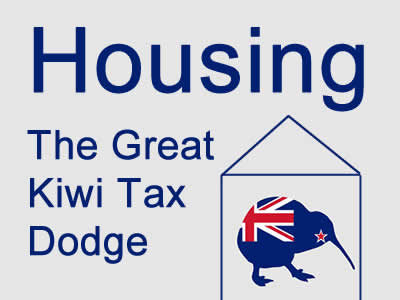
“favourable tax treatment of housing …should be removed” (OECD Economic Surveys of New Zealand April 2011)
My 5 point plan for housing has prompted a fair bit of debate and I’d like to respond to the points people have made.
Let’s start by clearing up one thing about housing as an investment. I am not anti-housing as an investment, I own several. How many do I need to buy to make that clear? Would I own the same number if the tax and finance playing fields were levelled? Yes. But currently the tax system is not fair – it favours housing.
Now let’s talk about tax. Independent tax reviews commissioned by New Zealand governments since the 1960s have consistently identified the failure to tax housing as a major problem in the tax system. That governments have consistently failed to implement this independent advice is an indictment on the over-riding self-interest of our political leaders and the wilful ignorance of the voting public. New Zealand stands out a mile on this issue, given most countries have some sort of tax on housing. In its most recent report on New Zealand the OECD said the failure to tax housing needs to be addressed. Sorry, but I don’t agree that we can keep our head in the sand over this issue any longer:
“favourable tax treatment of housing …should be removed” (OECD Economic Surveys of New Zealand April 2011).
What I propose is a wealth tax against which income tax is credited. This would not see anyone who already pays their full share of income tax pay more– structured properly the wealth tax would simply close loopholes wherein some can increment their wealth and not pay tax on that increment, and others can’t. You can find more details of this wealth tax proposal here, which we recommend as part of wider tax and welfare reform.
What about the potential value of high density development, an issue which seems to truly animate the land-obsessed New Zealand public? The 2011 Mercer Survey on the best cities to live in, ranked Auckland as third best city in the world. That is a laudable achievement and well-deserved. Of the other cities making up the top ten, only Vancouver had a lower population density (more urban sprawl) than Auckland. Top ranking Vienna had a population density of 4000 people per square kilometre which is a mile from the highest density area of Auckland (the North Shore at 1581 people). Other top-ten cities included Zurich (close to 4000), Munich (4280), Geneva (4101) and Sydney (maxing out at 8800 people per square kilometre in Sydney East and 7900 in Sydney West).
You get the picture? High density cities can be very liveable and attractive indeed. I think everybody would agree that thus far neither Auckland’s municipal leaders, developers and their bankers nor the residents of Auckland have had to seriously consider the potential of accommodation options other sprawling out and building houses over the hills and far away. But land prices have now reached a level which should be focusing minds on new solutions. Inner city living done well has huge potential – as evidenced by the quality of life delivered by European cities like Vienna and Zurich.- and it is a hell of a lot cheaper to service. We should be thinking about how we can connect that potential to the natural wealth of Auckland and other cities in New Zealand.
My comments about making user pays principles apply to new subdivisions is designed to reveal the true price of urban sprawl. If the potential buyers saw the true cost then they wouldn’t be so keen to pay the true price. By councils masking this in the rates bills for the city, they end up subsidising new buyers who should be paying the true marginal costs – Economics 101.
Anyway the arguments are robust, New Zealand needs to face up to the gross distortion to GDP, incomes and jobs brought about by these policies that favour housing over all other types of investment. Until we do expect the obvious result from misallocating investment capital, unnecessarily lower incomes and fewer jobs.

